
Journal of Flow Chemistry
Scope & Guideline
Exploring New Horizons in Flow Chemistry Research
Introduction
Aims and Scopes
- Flow Chemistry Methodologies:
Research primarily revolves around innovative flow chemistry techniques, including microreactor design, continuous flow processes, and the use of novel catalytic systems. - Sustainable Synthesis:
A consistent focus on green chemistry practices, including the reduction of waste and energy consumption in chemical synthesis through continuous flow technology. - Integration of Advanced Technologies:
Incorporating advanced technologies such as machine learning, automation, and real-time analytics to optimize flow processes and enhance reaction monitoring. - Biocatalysis and Enzymatic Reactions:
Exploration of biocatalytic processes in flow chemistry, highlighting the efficiency and sustainability of enzymatic reactions in continuous systems. - Microfluidic Systems and Applications:
Development and application of microfluidic devices for various chemical reactions, including droplet generation, emulsification, and nanoparticle synthesis.
Trending and Emerging
- Machine Learning and Process Optimization:
An increasing number of studies are leveraging machine learning techniques to optimize flow processes, demonstrating the potential for enhanced efficiency and predictive modeling in chemical synthesis. - Greener and Sustainable Chemistry:
A marked trend towards sustainable practices, including the development of eco-friendly reactions and processes that minimize environmental impact, is evident in recent publications. - Microfluidics and Nanotechnology:
Research exploring the intersection of microfluidics and nanotechnology is on the rise, focusing on applications such as nanoparticle synthesis, drug delivery systems, and advanced materials. - Continuous Biocatalysis:
There is a growing emphasis on the integration of biocatalysts in continuous flow systems, highlighting their role in enhancing reaction specificity and reducing waste in chemical processes. - Real-Time Monitoring and Analytics:
Emerging interest in real-time monitoring techniques, such as inline spectroscopy and mass spectrometry, is transforming how reactions are analyzed and optimized in flow chemistry.
Declining or Waning
- Traditional Batch Processes:
There is a noticeable decrease in publications focusing on conventional batch processes, as researchers increasingly favor continuous flow methodologies for their efficiency and scalability. - Basic Organic Synthesis:
Research centered on simple organic synthesis techniques has diminished, with a shift towards more complex and application-oriented flow chemistry innovations. - Single-Use Flow Systems:
Interest in single-use flow systems has declined as the field moves towards more sustainable and reusable flow reactor designs, emphasizing long-term solutions. - Low-Temperature Reactions:
Research on low-temperature reactions in flow chemistry has decreased, possibly due to the advancements in high-temperature and high-pressure capabilities of modern flow systems. - Basic Education in Flow Chemistry:
While educational initiatives are still present, there has been a decrease in publications focused solely on introductory or basic flow chemistry education, with a shift towards more advanced applications and research.
Similar Journals
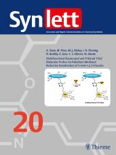
SYNLETT
Advancing the Frontiers of Organic SynthesisSYNLETT is a prominent academic journal dedicated to the field of Organic Chemistry, published by GEORG THIEME VERLAG KG. Since its inception in 1989, the journal has played a critical role in advancing the understanding of synthetic methodologies and organic compounds, offering a platform for innovative research and discoveries. With an ISSN of 0936-5214 and an E-ISSN of 1437-2096, SYNLETT is well-regarded in the academic community, presently positioned in the Q3 quartile for Organic Chemistry according to the 2023 category rankings. The journal is particularly valuable for researchers and professionals seeking insights into contemporary organic synthesis methods and their applications. Although it does not operate under an Open Access model, it remains a crucial resource within the field, contributing to significant advancements and collaborations globally. For those engaged in organic synthesis, SYNLETT not only encapsulates cutting-edge research but also inspires innovation in the discipline.

Physical Chemistry Research
Advancing the frontiers of physical chemistry research.Physical Chemistry Research, published by the Iranian Chemical Society, is an esteemed academic journal dedicated to advancing knowledge within the fields of *Fluid Flow and Transfer Processes*, *Physical and Theoretical Chemistry*, and *Statistical and Nonlinear Physics*. Since its inception in 2013, the journal has established a crucial platform for researchers, professionals, and students to share innovative findings and methodologies, enhancing collaboration and knowledge dissemination in the physical chemistry community. With impactful contributions recognized in Quartile 3 and Quartile 4 classifications across various categories, the journal is positioned to cultivate emerging research trends as it continues to converge through 2024. Researchers can benefit from diverse perspectives on crucial phenomena in physical chemistry, as the journal is indexed in prominent databases, further increasing accessibility and visibility. The *open access* policy ensures that cutting-edge research remains available to a broad audience, promoting the growth of the discipline globally.
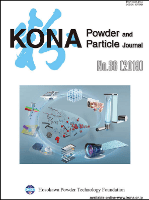
KONA Powder and Particle Journal
Transforming ideas into applications in particle technology.KONA Powder and Particle Journal, published by the HOSOKAWA POWDER TECHNOL FOUNDATION since 1983, is a leading open-access journal dedicated to advancing research in the fields of powder technology and particle science. Situated in Japan, this journal serves as a vital platform for researchers, professionals, and students, offering a wealth of knowledge on various applications and innovations in Chemical Engineering, Chemistry, Engineering, and Materials Science. With an impressive Q2 ranking across multiple categories in 2023 and notable Scopus rankings that position it among the top journals in its field, KONA fosters collaboration and discovery by providing immediate and unrestricted access to groundbreaking research. The journal not only promotes the dissemination of high-quality articles but also emphasizes the practical implications of powder and particle technology in real-world applications, making it an essential resource for advancing scientific knowledge and industrial practices.
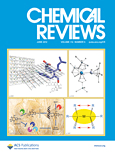
CHEMICAL REVIEWS
Advancing the Frontiers of Chemical Knowledge.Chemical Reviews, published by the American Chemical Society, is a leading journal in the field of chemistry, renowned for its comprehensive and authoritative reviews on a wide range of chemical topics. With its ISSN 0009-2665 and E-ISSN 1520-6890, this prestigious journal has maintained a remarkable trajectory since its inception in 1924, continuously contributing to advancements in the chemical sciences. As a Q1 journal in the Chemistry (miscellaneous) category, it stands at the forefront of research, boasting an impressive Scopus rank of #1 out of 408 in the field of General Chemistry, positioning it within the top 1% of the field. Chemical Reviews offers invaluable insights and serves as a critical resource for researchers, professionals, and students alike, facilitating knowledge exchange and fostering innovation in chemistry. While currently not open access, it remains a vital component of the scientific community, gathering an extensive readership base eager for the latest developments, methodologies, and theoretical frameworks in this dynamic discipline.
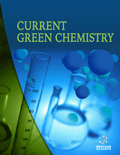
Current Green Chemistry
Unveiling the future of chemistry with eco-friendly insights.Current Green Chemistry, published by Bentham Science Publishers, is a pivotal scholarly resource devoted to advancing the field of green chemistry. With ISSN 2213-3461 and E-ISSN 2213-347X, this journal serves as a crucial platform for researchers and professionals to explore innovative and sustainable practices within the chemical sciences. The journal has demonstrated significant recognition, evidenced by its categorization in the third quartile (Q3) across various specializations including Analytical Chemistry and Inorganic Chemistry, and even a fourth quartile (Q4) in Organic Chemistry, according to the latest Scopus metrics. This indicates a growing influence in relevant fields, making it a valuable reference for contemporary environmental initiatives. The journal's accessible nature, although not open access, ensures researchers can still engage with high-quality, peer-reviewed content. Spanning an impressive converged period from 2019 to 2024, Current Green Chemistry is committed to enhancing the visibility of groundbreaking research that aligns with sustainable development objectives, making it an essential resource for anyone interested in the future of chemistry.
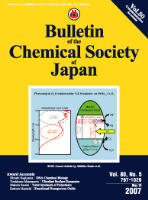
BULLETIN OF THE CHEMICAL SOCIETY OF JAPAN
Advancing Chemistry: Bridging Research and InnovationBULLETIN OF THE CHEMICAL SOCIETY OF JAPAN, published by the esteemed Chemical Society of Japan, serves as a pivotal platform for the dissemination of cutting-edge research in the multifaceted field of chemistry. With an ISSN of 0009-2673 and an E-ISSN of 1348-0634, this journal has been integral in fostering the growth of chemical sciences globally since its inception in 1965. The journal holds an impressive Q2 ranking in the Chemistry (miscellaneous) category, indicating its relevance and influence within the academic community, as reflected by its Scopus rank of #104/408, placing it in the 74th percentile. Although it is not an open-access journal, its rich content, which spans a wide range of topics in general chemistry, remains highly valued by researchers, professionals, and students alike, affirming its crucial role in advancing both theoretical knowledge and practical applications in chemistry. As it converges towards 2024, the bulletin continues to uphold its commitment to excellence in scientific communication and research dissemination in Japan and beyond.

Reactions
Empowering Researchers with Open Access InsightsReactions is a dynamic open-access journal published by MDPI, dedicated to the advancement of research in the fields of Chemical Engineering and Chemistry. Launched in 2020, the journal aims to provide a platform for scientists and researchers to share their findings and innovations, facilitating the synthesis and dissemination of knowledge within the global academic community. With an impact factor that reflects its growing influence, Reactions ranks 47th in the Chemical Engineering category and 72nd in Chemistry on Scopus, placing it within the vibrant landscape of contemporary chemical research. Housed in the picturesque city of Basel, Switzerland, the journal is committed to open access, ensuring that its high-quality content is readily available to all. This commitment not only enhances visibility but also fosters collaboration among researchers, professionals, and students striving to push the boundaries of chemical sciences. As we look towards 2024 and beyond, Reactions continues to encourage submissions that explore groundbreaking methodologies, innovative applications, and transformative theoretical frameworks in chemistry and chemical engineering.

Nature Synthesis
Pioneering Collaborative Research in SynthesisNature Synthesis, published by SpringerNature, is a premier peer-reviewed journal dedicated to advancing the field of synthesis in chemistry and materials science. With an impressive impact factor and categorized in the Q1 quartile for Chemistry (miscellaneous), Inorganic Chemistry, Materials Chemistry, and Organic Chemistry, it ranks prominently among its peers, reflecting its high-quality research output and relevance.
This journal provides a platform for researchers, professionals, and students to publish innovative synthesis methodologies, novel materials, and interdisciplinary approaches that push the boundaries of chemistry. Operating under an Open Access model, it ensures that research is widely accessible, fostering collaboration and engagement across the global scientific community.
Situated in the United Kingdom, Nature Synthesis is committed to contributing to the scientific discourse from 2022 to 2024, and beyond, as it continues to highlight significant advancements across chemistry domains.

Catalysts
Exploring the Frontiers of Catalysis and ChemistryCatalysts is a leading academic journal in the field of catalysis, published by MDPI since 2011 and well-regarded for its commitment to open access publishing. Based in Switzerland, this journal delivers innovative research and reviews that span various aspects of catalysis, from heterogeneous and homogeneous catalysis to the development of novel catalytic systems. With a commendable impact factor and a notable Q2 ranking in both Catalysis and Physical and Theoretical Chemistry categories, Catalysts plays a critical role in advancing the scientific discourse in these fields. The open-access model ensures that all research articles are readily accessible to researchers and professionals worldwide, fostering collaboration and accessibility to high-quality scientific literature. As the journal continues to publish cutting-edge studies up to its convergence in 2024, it remains an essential resource for anyone involved in catalysis research, from seasoned professionals to emerging scholars.

Eurasian Journal of Chemistry
Empowering Knowledge Sharing in ChemistryEurasian Journal of Chemistry is an emerging open-access journal published by KARAGANDA STATE UNIVERSITY in Kazakhstan. With a focus on the diverse and dynamic field of chemistry, this journal aims to disseminate cutting-edge research and innovative findings from various branches of chemistry, engaging a global audience of researchers, professionals, and students. Despite its recent inception in 2023, the journal is strategically positioned within the field, currently ranked in the fourth quartile of Scopus for General Chemistry, indicating its potential for growth and contribution to the scientific community. The ISSN of the journal is 2959-0663 with an electronic counterpart of 2959-0671, ensuring wide accessibility to its rich content. With an open-access model, the Eurasian Journal of Chemistry promotes the sharing of knowledge and advances in research to foster collaboration and inspiration across the globe.